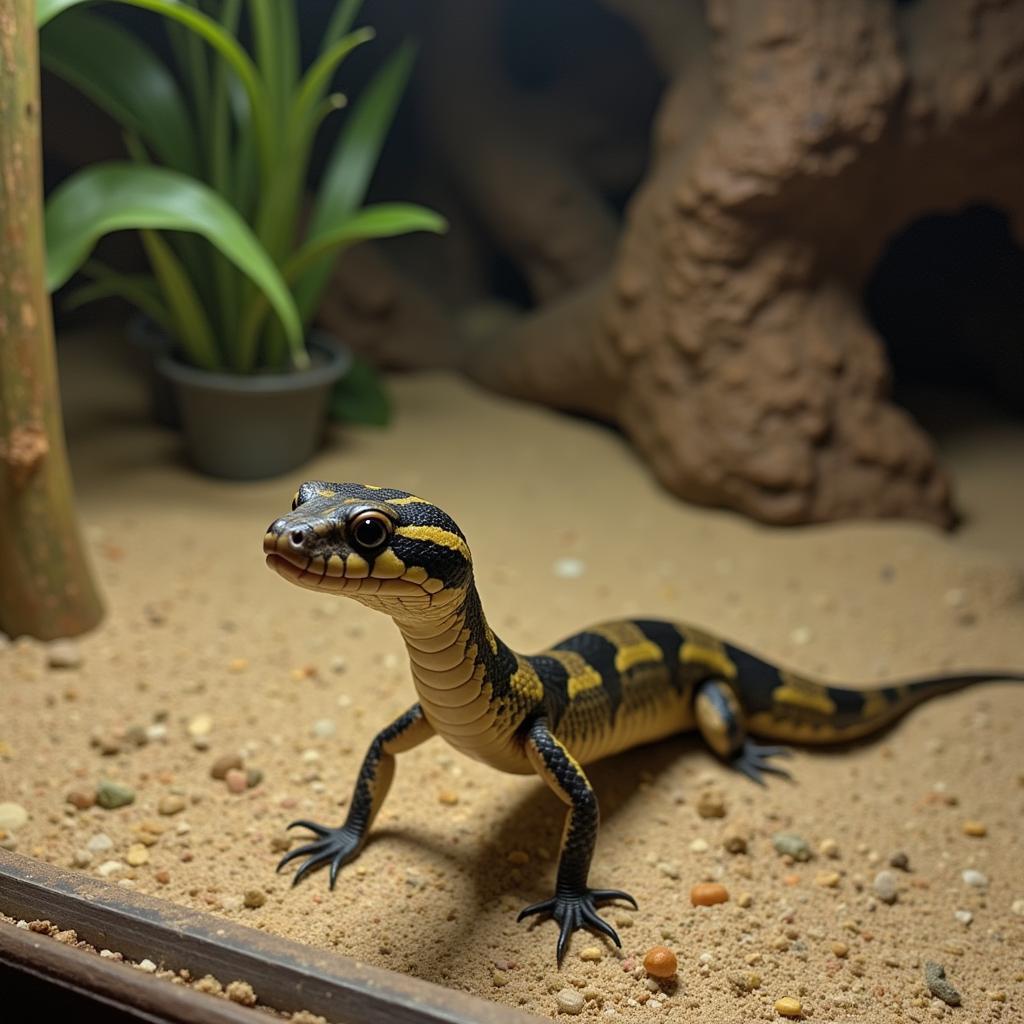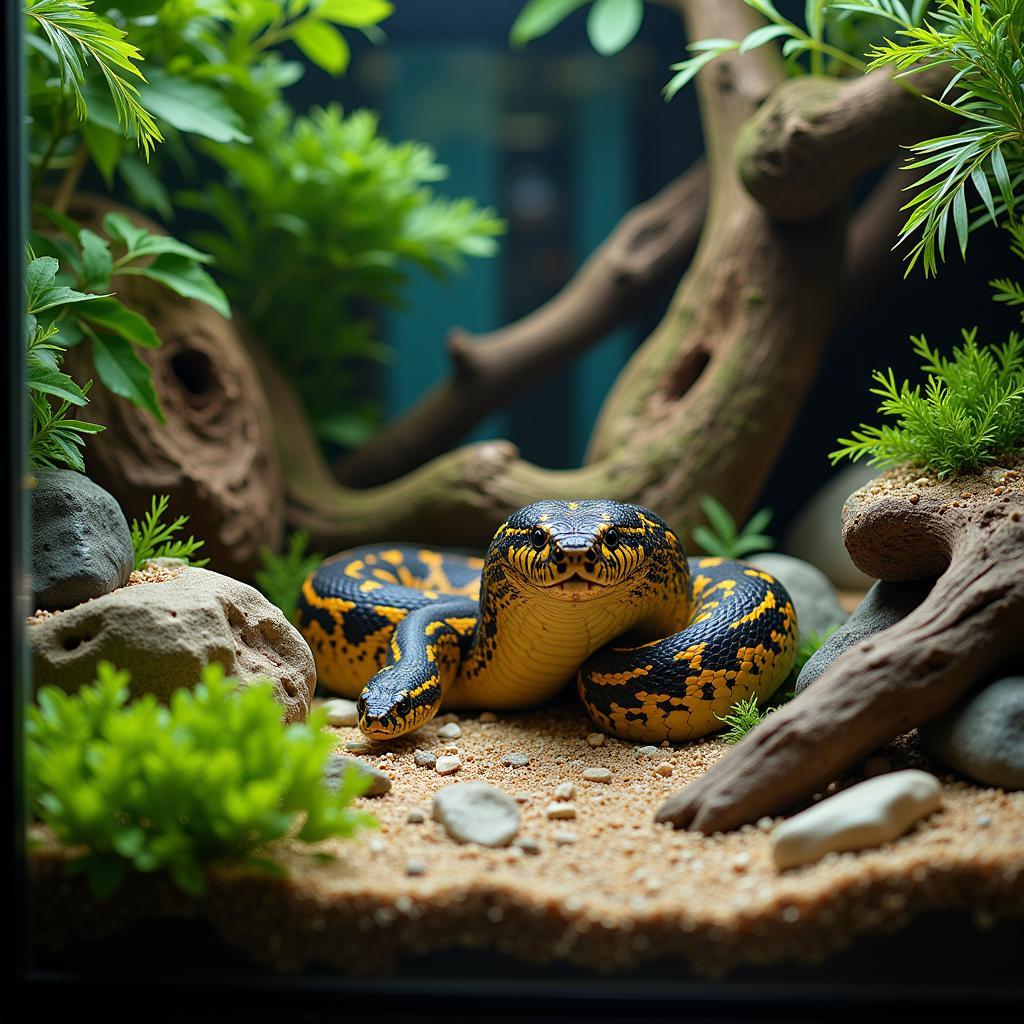Do Snakes Get Bored? It’s a question that sparks curiosity in many animal lovers. While snakes may not express boredom in the same way humans do, understanding their behavior and needs can shed light on their inner world and how we can provide the best possible care for these fascinating creatures.
Unraveling the Mystery of Reptile Ennui
Reptiles, including snakes, have different brain structures and cognitive abilities compared to mammals. They lack the prefrontal cortex responsible for complex emotions and higher-level thinking in humans. This difference makes it difficult to definitively say whether snakes experience boredom in the same way we do. However, observing their behavior can give us clues about their mental state.
Snakes in captivity often exhibit behaviors that could be interpreted as signs of boredom or stress. These include:
- Restlessness: Pacing back and forth, rubbing against enclosure walls, and attempting to escape.
- Loss of appetite: Refusal to eat even favorite prey items.
- Increased aggression: Striking at anything that comes near the enclosure.
- Lethargy: Excessive sleeping or hiding.
- Stereotypic behaviors: Repetitive, seemingly purposeless actions.
 Snake pacing in its enclosure
Snake pacing in its enclosure
These behaviors can stem from various factors, including inadequate enclosure size, lack of enrichment, improper temperature or humidity levels, and underlying health issues. Addressing these potential problems is crucial for the snake’s well-being, regardless of whether they are experiencing “boredom” in the human sense.
Enrichment: Stimulating a Snake’s Senses
Providing environmental enrichment is vital for captive snakes. Enrichment aims to stimulate their natural instincts and provide opportunities for exploration, problem-solving, and physical activity. Examples of enrichment include:
- Branches and climbing structures: Allow snakes to exercise their climbing muscles and explore different levels within their enclosure.
- Hiding places: Offer a sense of security and allow snakes to retreat when they feel threatened or overwhelmed. This can include caves, tunnels, and dense foliage.
- Substrate variety: Different textures and depths of substrate allow snakes to burrow, explore, and thermoregulate effectively.
- Scent trails: Introducing novel scents using safe, natural materials can stimulate a snake’s olfactory senses.
 Snake exploring an enriched enclosure
Snake exploring an enriched enclosure
Addressing the “Do Snakes Get Bored” Question Through Behavior
While we can’t definitively know if snakes feel boredom, we can observe their responses to environmental changes. A snake that becomes more active and engaged after the introduction of enrichment items suggests that the changes are positive and contribute to their well-being.
Beyond Boredom: Understanding Snake Behavior
It’s crucial to remember that snakes are not social animals like dogs or cats. They don’t require the same level of interaction and attention. Misinterpreting their behavior can lead to unnecessary stress for both the snake and the owner. Observing their natural behaviors, such as basking, exploring, and hunting, is key to understanding their needs and providing appropriate care.
Dr. Sarah Ramirez, a herpetologist specializing in snake behavior, notes, “While we can’t directly measure boredom in snakes, providing a stimulating environment allows them to express natural behaviors, contributing to their overall health and well-being.”
Recognizing Signs of Stress and Illness
Changes in behavior can also indicate illness or stress. If a snake suddenly exhibits unusual behavior, such as excessive hiding, loss of appetite, or difficulty shedding, it’s essential to consult a veterinarian specializing in reptiles.
Dr. Michael Carter, a veterinarian with over 20 years of experience treating reptiles, adds, “Sudden changes in behavior are often the first sign of a health problem in snakes. Early intervention is key to a successful recovery.”
 Veterinarian examining a snake
Veterinarian examining a snake
Conclusion: Providing the Best Care for Your Snake
Do snakes get bored? While the answer remains elusive, focusing on providing a stimulating and enriching environment is paramount. By understanding their natural behaviors and responding to their needs, we can ensure our scaly companions live healthy, fulfilling lives. Remember, providing a stimulating environment isn’t just about preventing boredom; it’s about promoting the overall health and well-being of your snake.
FAQ
- How can I tell if my snake is stressed?
- What are some signs of illness in snakes?
- How often should I clean my snake’s enclosure?
- What is the ideal temperature and humidity for my snake species?
- What are some safe and effective enrichment ideas for snakes?
- How can I create a natural-looking habitat for my snake?
- Where can I find a veterinarian specializing in reptiles?
For further assistance, please contact us: Phone: 0902476650, Email: [email protected] Or visit us at: 139 Đ. Võ Văn Kiệt, Hoà Long, Bà Rịa, Bà Rịa – Vũng Tàu, Việt Nam. We have a 24/7 customer support team.





